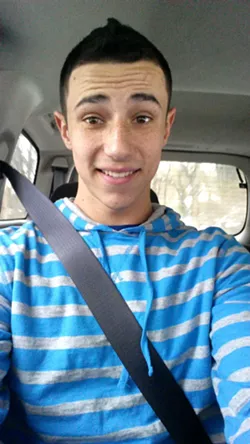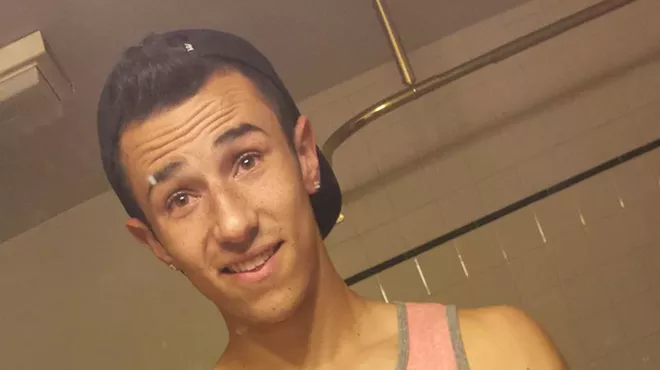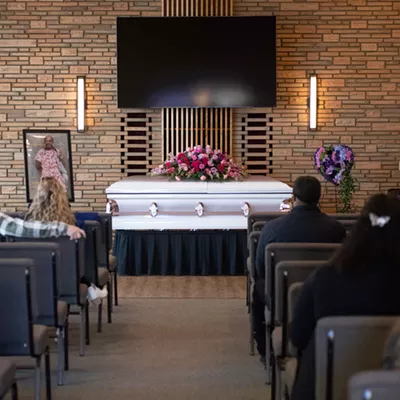Thursday, November 17, 2016
Where to go for help if you or someone you know is suicidal
On this week's cover is the story of a 19-year-old kid from Coeur d'Alene who worked as a confidential informant, buying drugs for the Idaho State Police.
Just 11 days after ISP signed him up as a drug informant, Wall was found dead from a single gunshot to the head. The police investigation into his death is still ongoing, and though some of the evidence is suspicious (you'll have to read the story for more on that), it is also possible that Wall died by suicide.
Indeed, Wall's mom, Courtney McKinnie says her son struggled with depression throughout his teen years.
In the six months since her son's death, McKinnie has been frantically searching for answers, though she has found few. In conversations with police, the coroner, funeral home employees and with Isaiah's friends, the truth of Wall's death remains elusive.
Regardless, McKinnie says it has become her mission to protect others like her son.
"I'm trying to make sure we fight to save lives," she says, adding that one part of that fight is showing people where to get help.
If you're feeling hopeless or alone or are thinking about harming yourself — or if you know someone struggling with these problems — here is where you can go:
In North Idaho:
• The Northern Idaho Crisis Center is open 24/7, every day of the year, and provides in-person and over-the-phone help for adults struggling with mental health issues. Contact them by phone at 208-625-4884.
"We are there to stabilize them, and to get them through the crisis," says Claudia Miewald, director of behavioral health for Kootenai Health.
The crisis center has staff available to talk in person or over the phone with those in need and beds for people to sleep. Staff will also help people get in touch with long-term resources.
• Although there is no physical location dedicated to helping juveniles through mental health issues, local emergency rooms are always a viable option, says Don Robinson, manager of the Northern Idaho Crisis Center.
"If someone is feeling suicidal, all of the hospitals have emergency departments," Robinson says. "It would never be wrong to go to the local emergency room."
• In addition to the national Suicide Prevention Hotline (1-800-273-8255 or 273-TALK), Idaho has a text suicide hotline. That number is 208-398-4357.
• For those in North Idaho who cannot afford mental health services and/or don't have insurance, there are options: Heritage Health provides behavioral health services for children and adults in Kootenai and Shoshone Counties on a sliding scale.
• The Idaho Department of Health and Welfare also has mental health resources. In Coeur d'Alene, call 208-769-1406. In-person services available at the Moody Building 2195 Ironwood Court.
In Eastern Washington:
• Frontier Behavioral Health is one of the main mental health service providers in the area, and their website is packed with information.
• The gateway into mental health services for those in crisis, for those not in immediate danger but who need help, and for those who just have questions is First Call for Help: 509-838-4428.
• Depending on the seriousness of the situation, Frontier has the ability to send a designated mental health professional to respond to a crisis situation. MHPs have authority under state law to involuntarily detain someone who is at risk of harming themselves.
How you can help someone thinking about harming themselves:
• Learn the warning signs:
— Talking about wanting to die or kill oneself
— Sudden change in behavior; seeming happier or calmer
— If the person is withdrawn, or isolated
— Loss of interest in things the person once cared about
— Giving away their possessions
— Talking about feeling hopeless or having no reason to live
— Talking about being a burden to others
— Talking about feeling trapped
— Acting anxious or agitated; reckless behavior
• Consider taking QPR (Question Persuade Refer) training. It's a 90- to 120-minute class similar to training for CPR. The class teaches people who don't have a medical background how to talk to someone struggling with suicidal thoughts.
"A lot of times, people fear that once they bring up suicide, somehow they've planted the idea in the person's mind, and that is not true," Miewald says. "Recognize those warning signs and don't be afraid to talk to your friend or loved one about this, and persuade them to get help."
• Call the Idaho Care Line: 211 — for people who don't know where to go or who to talk to for help, call here first. They'll connect you with the appropriate resources.
• Many people who are struggling with depression and other mental illness don't want to talk about it. But one of the best things you can do, Miewald says, is start the conversation.
"A suicidal person may not always ask for help, but that doesn't mean they don't want the help," she says. "Recognize those signs and don't be afraid to talk to your friend or loved one. Persuade them to get help."
Tags: Isaiah Wall , Courtney McKinnie , confidential informant , Idaho State Police , suicide , depression , mental health , News , Image


















